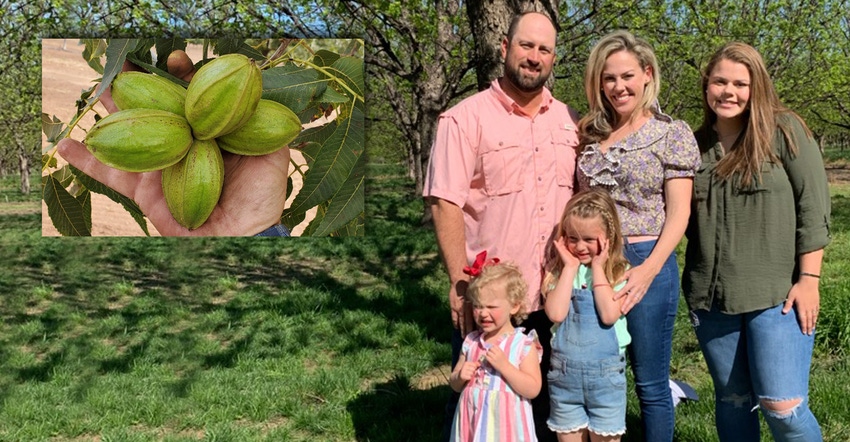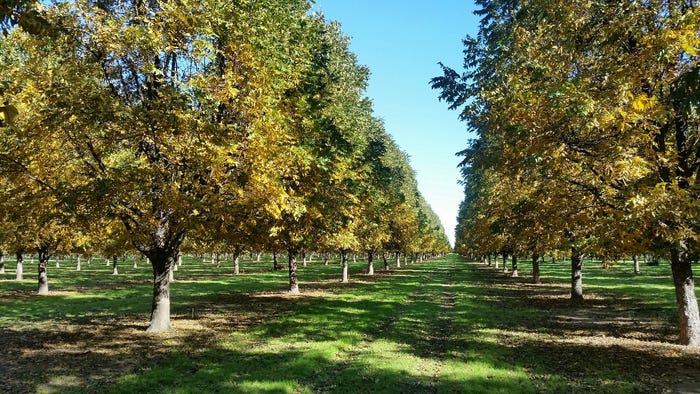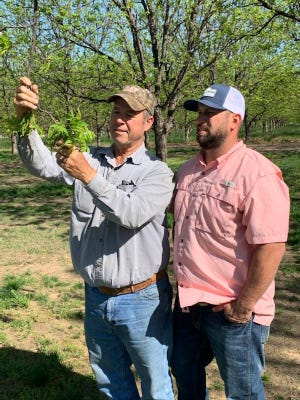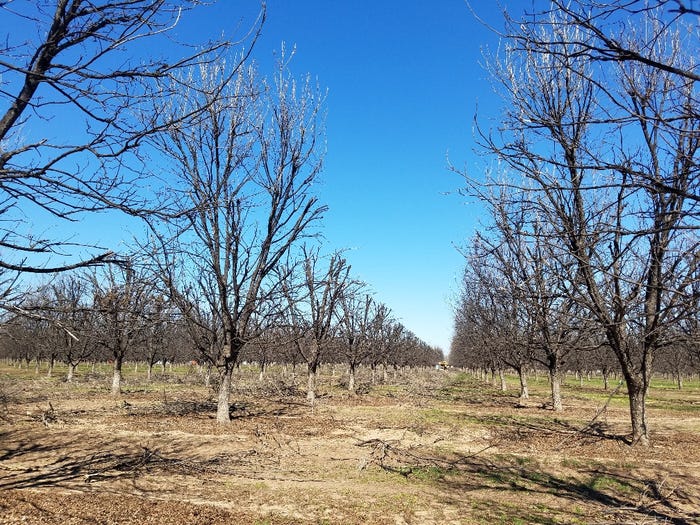
Producer Jake Montz says experience is his best teacher. The lessons he's learned through extreme weather events have not only introduced him to new management practices but increased sustainability on his farm.
Montz manages 47,000 pecan trees on his family's orchard near Wichita Falls, Texas. He grows Pawnee, Nacono and Lakota pecans in a region that receives about 30 inches of annual rainfall, which is "about half of what the pecan trees need on a normal year," he says.
The other half is pumped out of the Seymour Aquifer, a water supply that extends across north-central Texas. "It's a small shallow aquifer. Our wells are only 50-feet deep. We don't have a lot of deep irrigation wells, so we drill a lot of little wells," Montz said. "You've got to make it all work together."
A three-year drought that began in 2013 had Montz searching for ways to conserve moisture.

"2014 and 2015 were tough on pecans," says Montz, who serves on the Texas Pecan Growers Association's board of directors. "Through drought, we learned some practices we still use today to maintain our orchard floors."
Weeds competing for moisture were a primary concern.
"We tried spraying it all. We tried mowing it short, thinking short groundcover would use less water than a tall groundcover," he says.
Searching for answers, he reached out to Noble Foundation Pecan Specialist Charles Rohla, who suggested he treat the weeds like a cover crop.
"Basically, terminate it like you would terminate a cover crop and leave it alone," Montz says. "It looks terrible, but it's the absolute best thing for conserving soil moisture."
Because the weed cover is thick, it also prevents further weed competition. "It's also like a standing mulch," he adds.
"We found that was the best way to manage soil moisture when irrigation systems are stressed. We had to figure out a way to keep as much water in the soil as we could."
One-by-One
The Montz family farm began with Jake's great grandfather, Warner Barger, but pecan production originated with his father, Tim Montz. "My father started growing pecans when I was young. In our part of the world, everybody grew wheat, mainly for cattle. We had some cows, mainly yearlings."
Tim also performed custom work and began leasing land that had pecan orchards. "He started taking care of some pecan trees, borrowing sprayers and harvesters and learning more about it. He started going to Texas Pecan Growers Association meetings and meeting with other farmers, and planted trees as he could afford."
 (Tim and Jake Montz look for female flowers on the new shoots. Photo courtesy of Keri Montz.)
(Tim and Jake Montz look for female flowers on the new shoots. Photo courtesy of Keri Montz.)

The Montz family did a little bit of everything to make it work, Jake says. "When the trees were young, we had a little produce market in Wichita Falls, and we grew a lot of our own vegetables. We'd plant a few acres of pecan trees and we'd grow vegetables in the middles."
They also leased nearby orchards and began buying them out, in the meantime planting their own trees. It can take 10 years for an orchard to start producing, Montz says.
"Finally, all these trees we planted started coming into production, so they started paying for themselves and doing pretty well. We kept planting trees and backed off of everything else. And now, all I do in the farm operation is pecan trees."
Sustainability
Another management practice Montz adopted to increase production sustainability is within their hedging program. Montz compares hedging to pruning but with huge saws used to cut the trees down to maintain a prescribed size.
"Rather than pushing it out (the pruned limbs) and burning it, we try to chip it and leave it in the orchard floor so some of those nutrients can cycle."

Fresh hedging cut at Jake Montz's pecan orchard. Photo courtesy of Jake Montz.
On his poorer sandier soils, where he plants seedlings, Montz is using cover crops in between the rows to improve soil health.
"Some of the soils are farmed out from having wheat over and over for years for grazing, so I'm trying to build a little bit more organic material in there."
Once the cover crop heads out, Montz uses a heavy roller to roll over the cover. "I'll roll it down and leave it there. It makes a mat that helps hold moisture and suppress weeds."
Montz has tried several different mixes of rye, clover, oat, wheat, winter pea, and vetch. He says he won't plant the rye again. "It's too tall.
"We're always experimenting and playing, trying to figure out which one does the best."
He also takes soil samples and tissue samples from the pecan leaves. "We take soil tests about every 4 years, so we are only applying what the trees need. Every fall they do leaf or tissue sampling, which tells us what our nutrients are and helps us decide what our fertilizer program's going to be for the coming year. The fertilizer I'm putting out now is because of the tissue samples I took last July."
Exports
American pecan farmers produce 80% of the world's pecan supply, according to the American Pecan Council. Montz produces pecan varieties primarily for the export market, which are twice as big as those sold domestically.
"In 2016, I exported about 60% of our crop to China," he says. But tariffs are hurting his profit margin.
After losing his 2018 crop to a freeze, Montz was hopeful about his bumper 2019 crop. "This year, the biggest issue was trade tariffs. I sold pecans for less than I have in a decade. So, what should've been a big moneymaker, especially coming after 2018's complete freeze out, wasn't, because of the tariffs."
In addition to producing pecans, the Montz family also owns two retail stores, which are managed by his sister, Jill Montz. The stores, called The Pecan Shed, are located in Wichita Falls and along Highway 287 in Henrietta.
Montz says the more vertically integrated you can be as a producer, the better off you are. "The more retail sales our stores can do and the more direct to consumer marketing we can do, the better. And we're always trying to grow that part of the business.
"We're still our biggest customer."
For more information about The Pecan Shed and Montz's pecan products, go to https://www.pecanshed.com/ or for more information about pecans and recipes, visit the American Pecan Council.
About the Author(s)
You May Also Like






